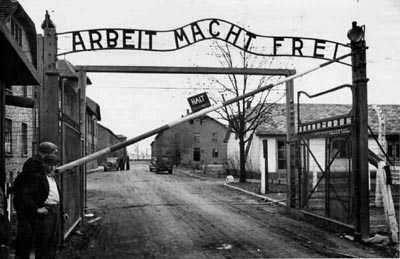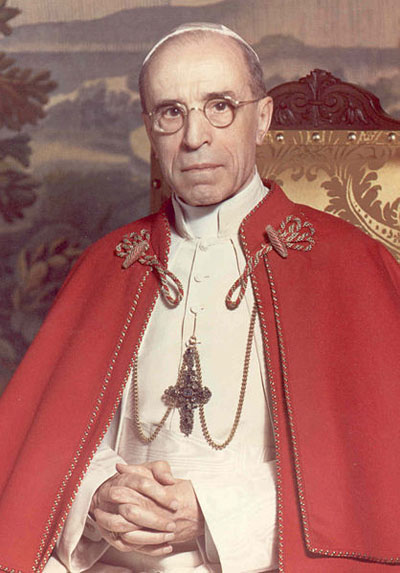Throwing the Book at the Church
The evidence doesn’t bear out Harvard scholar Daniel Goldhagen’s assertion charge that the swastika above Auschwitz was — ideologically speaking — really just a crooked cross
Tibor Krausz
The Jerusalem Report, July 14, 2003
We’ve no trouble accepting that any average Fritz or Ivan may be capable of homicide; yet when it comes to systematic genocide we generally feel the need to peg the monstrous crime to a matching monster: a Hitler or a Stalin. It’s as if populations were morally amorphous masses now and then led astray by evil geniuses. The idea that a whole nation — or heaven forbid a whole culture — can be guilty as charged for epochal outrages seems an alien concept in the prevailing moral relativism of the West. The proposition then that a world religion en masse — pontiff, bishop, and priest — must be arrayed in the dock for the Holocaust should prove unthinkable. Then again, Daniel Jonah Goldhagen hasn’t been one to pussyfoot around liberal sensibilities.

In his chartbusting historical treatise “Hitler’s Willing Executioners: Ordinary Germans and the Holocaust” (1997), the young Harvard professor set out to demolish the first conventional notion; namely, that average citizens of the Third Reich, pawns of Hitler’s though they were, couldn’t possibly engineer the crimes of Auschwitz and Treblinka — only the Fuhrer and his depraved henchmen could and did. Goldhagen argued the converse: that Hitler and his Nazi Party were mere manifestations of collective German will. Although he was feted as the last word in Holocaust scholarship in much of the international press (not least in Germany), he came in for enough scholarly flak to ruin his academic career a hundred times over. Despite having been labeled everything from a bigoted polemicist to a PhD-holding charlatan, Goldhagen remains at Harvard’s Center for European Studies.
And undaunted, he’s now poking accepted wisdom in the other eye with “A Moral Reckoning: The Role of the Catholic Church in the Holocaust and its Unfulfilled Duty of Repair.” In it Goldhagen posits that the swastika over Auschwitz was — ideologically speaking — just a crooked cross. And this because of: a) Catholicism's 2,000-year history of vicious anti-Semitism and b) the Church's deafening, complicit silence during the Holocaust. Predictably, Goldhagen is at the vortex of another raging hullabaloo, now standing accused by some of being an inveterate scandalmonger as well. Yet his views on the Church, rightly or wrongly, follow logically from his first thesis. If the Nazis didn't need to egg the already murderous Germans on to genocide, then a priori Nazi propaganda could have little in the way of providing the motivating animus for genocidal anti-Semitism. But then what did? He lays it out: For millennia Catholics demonized Jews as "Christ-killers." Medieval laws forbade intermarriage between Jew and Catholic; barred Jews from key professions; required them to wear identifying badges; and quartered them in cramped ghettos — all precedents for Nazi practice. The Jesuits excluded from their brotherhood all applicants with any Jewish ancestry up to five generations, thus anticipating Hitler's racist laws. The Crusades saw entire Jewish communities put to the sword, in a harbinger of genocide.
Yet it's war-time Pope Pius XII Goldhagen tar-and-feathers for the Church's sins in the Holocaust. His book follows a dozen recent offerings bearing on the pontiff, which generally either condemn or absolve him. Goldhagen liberally adopts arguments from several, such as "Under His Very Windows," by Holocaust historian Susan Zuccotti (2001). Giving credit where it’s due, Goldhagen reiterates their litany of charges, handing over a damning indictment: autocratic and anti-Semitic, Pius XII (formerly Eugenio Pacelli) played along with Hitler by keeping silent about the plight of Jews being marched to their deaths "under his very windows," as Zuccotti argued. After the war this political chameleon hastily turned colors, painting himself an erstwhile ally of Jews, duly assisted by a Church covering its back retroactively. Adding insult to injury, Goldhagen says, the late pope may soon be beatified. Goldhagen excoriates papal infallibility, the late 19th-century doctrine that lent modern popes dictatorial-cum-presumed prophetic powers — and may have served Hitler with a model for his fuhrerprinzip.

So far, so good. But then venturing on terra incognita, Goldhagen promptly loses his bearings. Deviating from the conventional charge of complicity by silence espoused by several authors before him, he accuses Pius XII's Church of actively colluding with the Nazis. Exhibit A: the Concordat between Hitler and the Holy See dating from 1933, the year of Hitler's accession. To Goldhagen, it’s pivotal proof of the Church's conspiracy with Nazism. Except that the document merely underlined Hitler's willingness to guarantee Catholicism's autonomous rights in return for the Church's recognition of the new regime. Righteous? Hardly. But nor is it wholly criminal — especially since the document said nothing about the status of Jews and the Final Solution. (Besides, Hitler signed a nonaggression pact with Stalin too, and much good it was worth.) Exhibit B gets him on firmer ground. It's Civilta cattolica, a Vatican mouthpiece. Decades before Hitler, the Jesuit periodical printed proto-Nazi racist libels about "the perfidious Jew" that read like carbon copies of the sadistically venomous Der Sturmer, which gave even hatemongering a bad name.
Then, come the Holocaust, the Church "thundered silence." Why wouldn't it? Goldhagen says. In their heart of hearts, he speculates, most Christians unreservedly subscribed to the Nazis' calumnies, even if they deemed extermination too extreme a punishment to fit Jewish crimes. Clerics normally acted, he writes, like "people who oppose the death penalty as a matter of principle, yet ... feel little sympathy for murderers [Christ-killers] put to death." At war's end, he reminds us, the Church helped super-killers like Adolf Eichmann and Josef Mengele escape to safety in South America by providing them with false documents; while Germany's Cardinal Adolf Bertram ordered a requiem mass for the dead Hitler. That said, his insistence that much of the clergy willingly assisted in genocide (like some chaplains who absolved killers) won't wash: the Nazis despised Christianity, regarding it an effeminate creed of compromise, and recruits to the SS (including the Holocaust's architects and perpetrators) were required to renounce their Christian faith — let alone expect succor from the Church.
* * *
Goldhagen condemns the Catholic Church, "this pan-European institution of world-hegemonic aspirations," for denying a causal link — "erecting an iron curtain" — between Christian anti-Semitism and its genocidal Nazi variety. Evidence doesn't bear him out. To be sure, Hitler availed himself of time-honored Christian calumnies; yet founding his racism on pseudoscientific (Social Darwinist) grounds -- biologically superior Aryans versus "subhumans" — he catapulted his anti-Semitism beyond all compromise. He framed his hatred of Jews (and much of humanity) in racial, not moral terms. Christian Slavs, too, he earmarked for extermination (or slavery at best). That's why the Nazis were genocidal even before setting the Holocaust in motion. In their euthanasia program, they murdered an estimated 100,000 mentally and physically infirm German Christians. "Genetically inferior" Gypsies, as well as gays, antisocials, and political opponents, would be slaughtered alongside Jews in the death camps. Catholics, even when damning Jews to proverbial hell for rejecting Jesus as Savior, at least offered them the redemptive hope of conversion, take it or leave it. For the Nazis a third-generation Jewish convert to Catholicism was just as beyond repair as a tenth-generation hasid. Curiously, Goldhagen acknowledges this much in passing, yet proceeds to ignore the implications.
Similarly undermining his anti-Catholic thesis, German Protestants, especially those belonging to the pro-Nazi Deutsche Christen wing, routinely outdid Catholics in their support for Nazism. Martin Luther, Protestantism's German founding prophet, was an archetypal anti-Semite who labeled Jews "the Devil's brood." One could reasonably argue, as Goldhagen does, that it's a baby step from Luther to Hitler and the Nazis' posters depicting Jews with horns, wielding Satan's pitchfork. But then why single Catholicism out? Why not equally blame Protestantism, whose German leaders, he claims (again in passing), "went on record urging their government to prosecute [its mass extermination of Jews] with zeal"? And how about Orthodoxy? Weren't the bloody pogroms in czarist Russia perpetrated by Orthodox Christians, authors of "The Protocols of the Elders of Zion"?
Troublingly, Goldhagen dumps all Christian sins in Catholicism's lap. By a dubious sleight of reasoning, he posits that Danish Christians famously saved their Jewish compatriots because they were Lutherans, not Catholics. Apparently then, anti-Semitism had died out in Danish Lutheranism, but not so in Germany where Luther's poisonous creed, Goldhagen says, "four centuries after his death, still inspired people" to hate Jews. How so?
* * *
Still, the question remains: Did theological anti-Semitism lead inevitably to Auschwitz? It's an intriguing idea; yet Goldhagen hasn't, alas, proven it. A miniaturist in listing details that support his thesis, he sketches his polemics with the broad brush of a muralist painting in black and white. He acknowledges, for instance, that vast differences existed in European Christians' attitude to Jews (from philo-Semitic Danes to implacably Jew-loathing Lithuanians), only to decry "the apologetic practice of superficially surveying the far-flung Church landscape with exculpatory bias." It doesn't help, either, when he undercuts his own case for a moral reckoning: "[B]ecause no court of judgment can, with authoritative finality, decree anyone's principles to be wrong, no higher authority exists than an individual's own thoughts and passions." Therefore, anti-Semitism is a moral relativistic matter of opinion we have no right to judge?
For all his work's shortcomings, though, his argument's thrust holds up: Fancying itself the depository of God's goodwill to humanity, the Church should reasonably have been expected to practice what it preaches about compassion, even at the expense of exposing itself to harassment in German-occupied areas. This presumed lightning rod of morals should have not only raised its institutional voice loud and clear in defense of Jews but actively saved them, despite their imputed theological "benightedness." Would the Church, Goldhagen asks poignantly, have retained its Olympian detachment during an ongoing holocaust of Christians, too? Whether the answer be yes or no, he argues, Catholicism has forfeited its self-anointed guardianship of universal morality.
Nonetheless, Goldhagen's call on Catholics to expunge all purportedly anti-Semitic tracts from the Gospels is far-fetched, if not outright absurd. (By the same token, would we want to excise passages from the Torah about Jews' chosen peoplehood just because it might offend Catholics?) More reasonable is his other proposal: that the Church, in its traditions of cleansing confession, do some soul-searching and own up accordingly, not the least sign of which would be opening sealed Vatican archives for scholarship. (Encouragingly, the postwar Second Vatican Council at long last cleared Jews of the "Christ-killer" blood-libel, he says. And John Paul II has been the first pope in history to have prayed inside a synagogue.) Goldhagen also recommends moral and material restitution by the Church to Jews and Israel. No doubt it’d be returned with interest paid in permanent goodwill between Jews and Catholics. Yet his book, though a subpoena to Catholics for a reckoning, falls short of delivering a winning indictment.